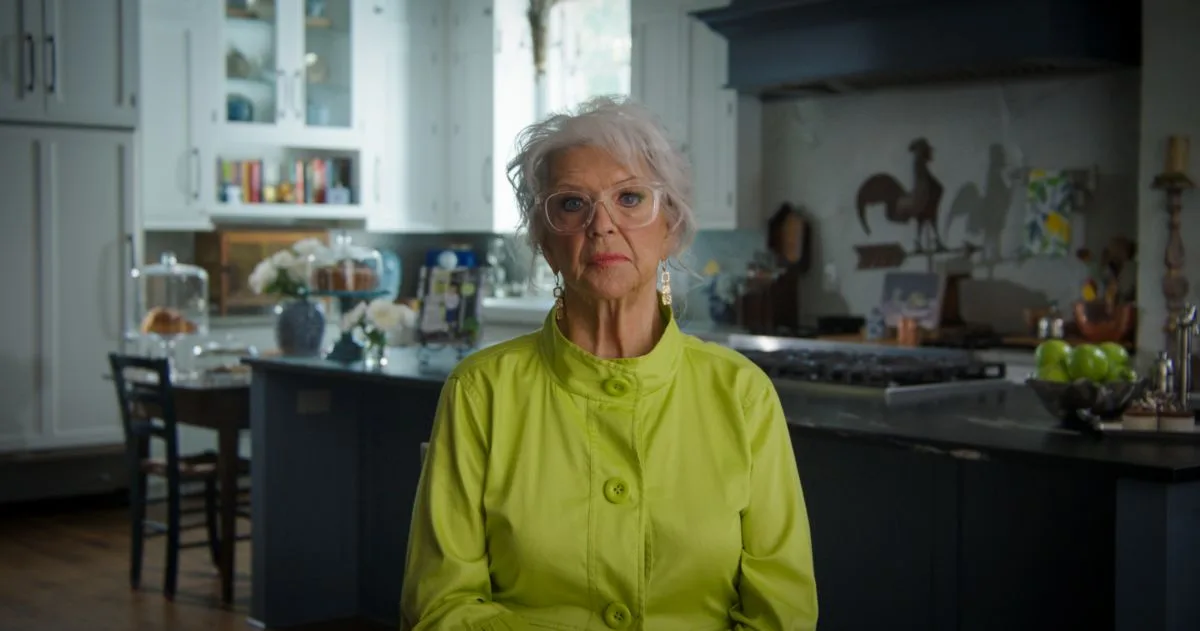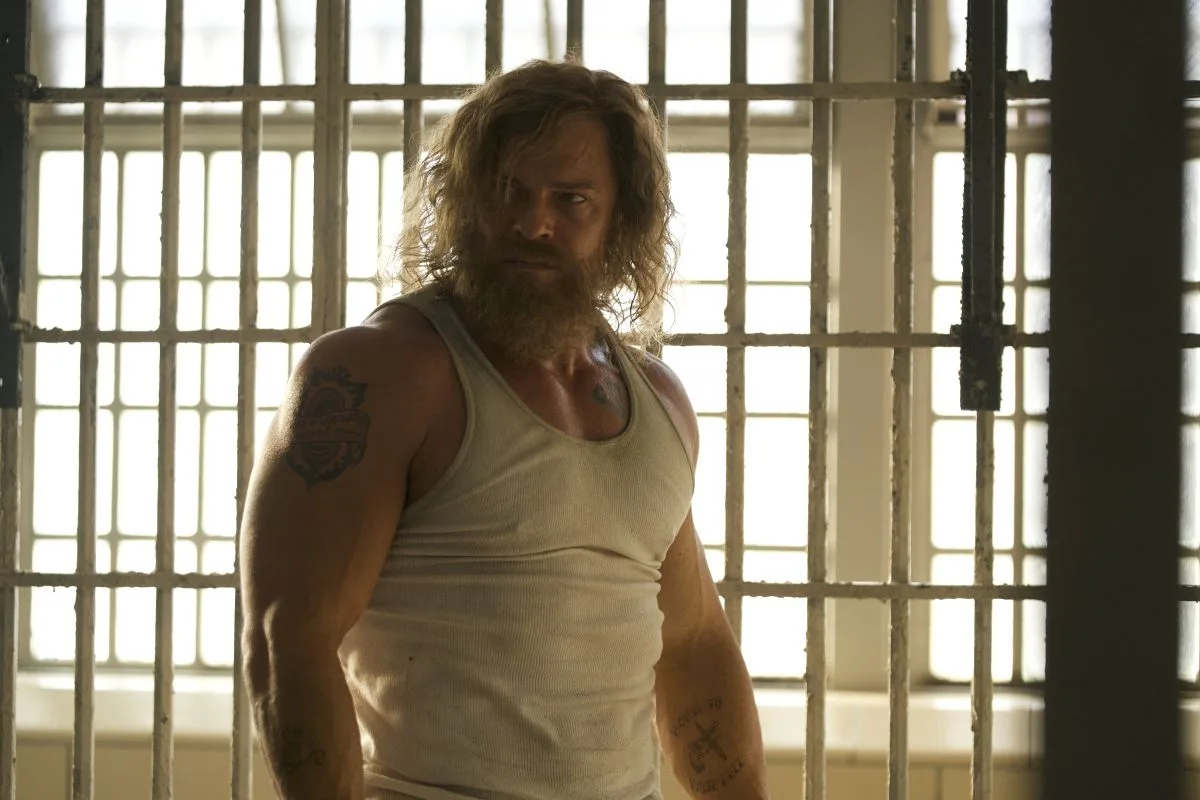The producers of Potsy Ponciroli’s take the “strong, silent type” to extremes in the playful “Motor City,” a movie that plays like a grittier cousin of John Woo’s “Silent Night” in that it’s another action flick with almost no dialogue. Ponciroli struggles sometimes to land on a tone, waffling between choices that feel more like action parody and brutal realism, leaving it kind of lost in an uncanny valley of storytelling that makes it feel much longer than its relatively brief runtime. Having said that, patience will be rewarded if you choose to visit “Motor City” as the film climaxes with a couple of wonderfully ludicrous showdowns—one truly bloody in the close quarters of an elevator and another on the streets of Detroit.
Casting helps too. Alan Ritchson has watched his star rise as the new face of Prime Video’s smash hit “Reacher,” a character not exactly known for his verbosity. An underrated performer on that show, he can convey a lot with a sly look or even a comforting smile, but he smartly doesn’t lean into the dialogue-free nature of “Motor City,” opting for a relatively subtle approach compared to other performers.
He knows he needs to be the stoic, determined center of the chaos as John Miller, an ex-con who falls for Shailene Woodley’s Sophia, earning the ire of her employer, a 1970s Detroit crime boss named Reynolds (Ben Foster). The snarling bad guy this time has the city under his thumb, including a police chief named Savick (Pablo Schreiber), who helps frame Miller to put him away, sending Sophia back into the arms of Reynolds. Of course, Reacher, I mean Miller, isn’t going to take that lightly, planning his revenge with the help of a skeptical cop named Kent (Ben McKenzie).
To be clear, “Motor City” isn’t a silent film; it’s just one with almost no dialogue (there are reportedly five lines). You can hear chatter in the background of a police station or the low hum of activity in a club, but the protagonists centered in the frame don’t talk; they express themselves through action as needed. A thumping score overseen by Detroit rock legend Jack White (who also cameos) becomes a character, as does a soundtrack of needle drops that’s shockingly expensive (Fleetwood Mac more than once) and shockingly non-Detroit (no Seger, really?).
Sadly, there’s not quite enough movie under the gimmick, and Ponciroli can’t maintain the directorial grip of a Woo, vacillating between a broad action style and self-serious blocking that makes it feel as if Bergman made a Jean-Claude Van Damme movie. The stunt work, especially in the final act, is impressive, but you can get that on “Reacher” too.

There’s a similar “almost there” quality to the otherwise very different “I Swear,” a TIFF premiere that argues for acceptance and understanding instead of merely treatment. It’s a heartstring-puller that’s manipulative but also emotionally resonant, thanks largely to committed work from its two effective leads. Writer/director Kirk Jones has waded into attempts at heartwarming before with projects like “Waking Ned Devine” and “Everybody’s Fine,” and subtlety isn’t exactly a strong suit. Still, he’s a solid director of performers, finding truthful beats for his cast here even when it’s easy to see them coming. It’s a movie that should be a bit darker, dirtier, and organic, but there’s enough genuine emotion in the eyes of its two leads that criticism becomes easier to push away.
John Davidson (played as a young man by Scott Ellis Watson and as an older man by Robert Aramayo) is an ordinary kid, happily going about his life, when he starts to notice involuntary movement in his neck. As if that’s not scary enough, he then starts to vocalize, often shouting profanities as he does so. Decades ago, in a small British town, no one had much of an idea about what Tourette’s Syndrome even was, let alone knew anyone who had it. Watson is excellent at conveying the fear that would come with such an onset, conveying through smart choices how much he knows that his parents (Steven Cree & Shirley Henderson) aren’t going to be normal about it.
Luckily, John finds solace in the home of a neighbor named Dottie Achenbach (the excellent Maxine Peake), who is dying of cancer. Perhaps that’s one of the reasons she refuses to judge John. She knows how unfair life can be. She not only fights for John in ways that no one else will, but she also welcomes him into her home. Jump to a few years later, as we see John try to go about the ordinary life of a young adult, even getting a job as a caretaker at a school with the wonderful Peter Mullan.
Mullan is always good, but “I Swear” belongs to Aramayo and Peake, both of whom add depth to the often-shallow melodrama. The script by Jones falls into a trap that often bothers me, wherein a disability becomes a plot device as John’s Tourette’s returns or disappears as the script demands. There’s an unpredictability to life with Tourette’s that this carefully polished script avoids, but every time that I was tempted to dismiss it as a TV Movie of the Week, Aramayo or Peake would do something that felt true. They ground it every time that it threatens to float away.

Finally, there’s the fascinating rise and fall of Paula Deen in one of the few documentaries I’ll be able to cover at TIFF. The truth is that I don’t miss a movie by Billy Corben, the great Florida filmmaker behind “Screwball,” “Men of War,” and the hit “Cocaine Cowboys” series. He’s a creative, brilliant filmmaker who is clearly attracted to larger-than-life personalities, people whose flaws, and often their mishandling of mistakes, led to their downfall. “Canceled: The Paula Deen Story” isn’t the gotcha piece that people may be expecting from someone who skewered A-Rod so memorably. On the contrary, it leans a bit too heavily into a public reclamation of the legacy of its subject, portraying her downfall as a media distraction. But Corben’s film makes some strong points about how people aggressively sharpened their knives when it was time to cut up the queen of butter.
Corben is a phenomenal interviewer, drawing great sound bites from not just Deen herself but her two sons, colleagues, and much from Gordon Elliott, who helped make the Southern cook a star. And she was a “cook,” not a chef, someone who appropriately got her start on an Elliott show in which he would go into people’s homes and make a meal out of whatever they had in their kitchen. Deen’s charm was as much her personality as her cooking, something that made her the belle of the ball with famous friends like Michelle Obama and Oprah Winfrey, and something that made her a target of criticism from Anthony Bourdain.
When Deen’s brother was sued, she was deposed, and she answered the question “Have you ever used the n-word?” with “Yes, of course.” She argues now that she was under oath and believed she had used it after having a gun held to her head by a Black man as a young woman. Not recently. Not in a business context. But ever. The collapse was sudden and massive, in no small part because of how poorly Deen and her team handled the fallout with awkward interviews and a statement that sounded manufactured. Deen and her people made numerous mistakes in the days and weeks following the release of the deposition, making the film almost a cautionary tale on how not to handle a public crisis.
Corben makes convincing points about how and why Deen’s downfall was almost celebrated, arguing that it was a distraction from actual racial issues in the country. If we can get rid of the racist Food Network personality, everything will be better. And the footage of a “Law & Order” episode that actually blended Deen’s saga with the shooting of Trayvon Martin is jaw-dropping in how tone deaf so many things were in that era. However, if you’re hoping for a reckoning with how Deen’s background as a Southern cook played a role, she doesn’t seem quite ready for that.
There are deeply complex racial issues at play in this story, from the early clip of Deen’s ancestors having slaves to the sense that she betrayed the Black community that embraced her, and Corben’s film just nibbles on those when I wanted a full bite. Still, Paula Deen is a fascinating figure, and this movie is going to make a full streaming meal when it eventually drops on Netflix or whatever service is smart enough to pick it up.












